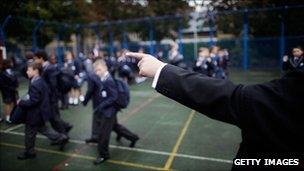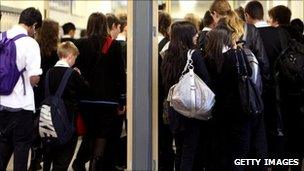'Illegal' school exclusions on the rise, says charity
- Published

Experts say official figures which show a drop in exclusions do not account for unofficial exclusions
Thousands of children are being unofficially excluded from school, and official statistics showing a drop in exclusions are misleading, says the children's charity Barnardo's.
Callum is 13-years-old and in his third year of secondary school in Swansea. He has learning and behavioural problems and has frequently been sent home from school.
His mother, Karina, says Callum's school has phoned her at work ten times to ask her to come and take her son home - often asking that he does not return for several days.
On the surface, it would seem that Callum is just another entry on the government's register of excluded children - the number of which has, according to official statistics, dropped dramatically over the past decade.
It has been a stated aim of successive governments to get the number of exclusions down and figures published by the Department for Education (DfE) show that since 1997 permanent exclusions from schools in England have more than halved from 12,300 to 5,740. Temporary exclusions are also at their lowest level since 2003.
Statistics for Wales, where Callum goes to school, show a similar drop.
Off-the-record exclusions
But experts say these government figures mask a rising problem: unofficial exclusions.
Take Callum, for example: while he has been temporarily excluded ten times, his mother says the school has officially recorded only one of these.
Callum's school failed to respond to the BBC's request for clarification.
Jane Evans from the children's charity Barnardo's has researched off-the-record exclusions.
"We don't know how big a problem it is but we can surmise that it probably is thousands of children who are unofficially excluded," she told BBC Radio 4's The Report, external.
Barnardo's concerns have also been raised in a report by the Centre for Social Justice which says unofficial exclusions are 'illegal'.
Jane Evans agrees:
"The Department for Education has updated guidance, external that states quite clearly that unofficial exclusions are illegal, and that any exclusion should be covered by the proper legal procedures."

Some schools are not following official exclusion procedures to keep exclusions off-the-record
When there is an official exclusion, schools must follow a strict procedure that includes sending a letter to the excluded child's parents which offers the opportunity to appeal against the school's decision.
If it is a temporary exclusion, homework should be sent home and marked by the school.
The Welsh schools' watchdog, Estyn, says it is also the case in Wales that schools should write to the parents and provide homework.
In theory, excluded children do not miss out on their education but Callum's mother, Karina, says neither of these things happened when her son was excluded.
"I am worried because he is in his third year, and he's only get two years left [before GCSEs].
"He's quite a bright child and I just don't feel that by them excluding him all these times that he's going to get anywhere," Karina says.
League table pressure
Some closely involved with the system say that while most head teachers take decisions in the best interest of students, they also face pressure to do well in league tables and to meet performance targets and are keen to keep exclusions off the record.
Michael Artemis is an educational psychologist who works with schools and local authorities.

The Boxing Academy has been successful in providing alternative education for excluded pupils
"What makes it most difficult is that everything is being driven by the performance requirement, so that people can't make honest decisions," he says.
The government says that it does not believe the number of illegal exclusions is high - although it acknowledges it is concerned about such cases.
In a statement, the Department for Education told the BBC:
"Whilst the Department takes the issue of illegal exclusion very seriously, we believe that the majority of head teachers take fair and legal decisions in relation to exclusions."
The DfE also stands by its use of league tables and performance targets:
"Publishing data on exclusions at national and local authority level is important for accountability, but we have no specific target for reducing the number of exclusions."
There are other concerns, too, involving the alternative education which must be provided for children who are officially excluded on a permanent basis.
A lot of alternative education is provided by charitable groups or privately-owned companies.
It can be an innovative way of reaching out to children in a way that mainstream education has not achieved, such as at the The Boxing Academy in London.
It caters for all the main aspects of a school curriculum, but is situated in a boxing gym and incorporates boxing into the school day.
Tom Ogg, who has taught at The Boxing Academy and has conducted research into alternative education provision, says the sector is largely unregulated.
He says alternative education provision is another way in which children can slip out of the system and be excluded from official statistics.
"We have no idea how many children are in these projects. The first step in dealing with any of these problems is knowing who is where."
Jane Evans from Barnardo's also has concerns about alternative education provision:
"I think we need to watch where schools become detached and devolved from local authorities, and ensure that checks still exist [but] where those are going to come from is still quite uncertain."
The government says it has asked for a review into the alternative provision sector.
The Children's Commissioner for England is also conducting an inquiry into school exclusions, and will report its findings to the government in March 2012.
The Report, external is on BBC Radio 4, external Thursday 6 October at 20:00 BST. Listen via the iPlayer, external or download the programme podcast, external.
- Published4 October 2011
- Published7 March 2012
- Published29 July 2011